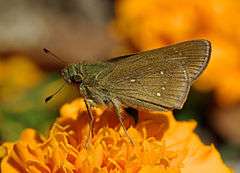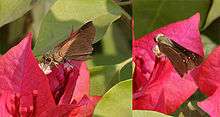Pelopidas mathias
| Dark small-branded swift | |
|---|---|
 | |
| Scientific classification | |
| Kingdom: | Animalia |
| Phylum: | Arthropoda |
| Class: | Insecta |
| Order: | Lepidoptera |
| Family: | Hesperiidae |
| Genus: | Pelopidas |
| Species: | P. mathias |
| Binomial name | |
| Pelopidas mathias (Fabricius, 1798) | |
| Synonyms | |
| |
Pelopidas mathias, the dark small-branded swift, small branded swift, lesser millet skipper or black branded swift, is a butterfly belonging to the family Hesperiidae. It is found throughout much of Southeast and East Asia, and as far as the Philippines. It is also present in tropical Africa and Arabia.
Description

In Kolkata, West Bengal, India
In 1891, Edward Yerbury Watson described it as:
Male. Upperside olive brown: forewing with two small yellowish semi-transparent spots within end of cell, three before the apex, and in the male three oblique discal spots followed by a dark-bordered slender straight impressed glandular streak: hindwing with one or two very indistinct pale discal spots. Female with five discal spots in the forewing, and four or five in the hindwing. Underside paler ; markings more distinct; hindwing also with a spot at upper end of the cell. Expanse 1.6 inch.[1](Moore)[2]
Role in agriculture
P. mathias is considered a pest to rice-growing cultures, although it is not as damaging to rice plants as Parnara guttata. Newly hatched caterpillars are especially voracious in eating young seedlings. They also use silken threads to roll up and stitch together partially eaten leaves for more efficient consumption.[3]
Subspecies
- Pelopidas mathias mathias
- Pelopidas mathias oberthueri Evans, 1937
- Pelopidas mathias repetita (Butler, 1882) (Admiraly Island, Dampier Island, Vulcan Island)
References
| Wikimedia Commons has media related to Pelopidas mathias. |
| Wikispecies has information related to: Pelopidas mathias |
- ↑ 1.6 inches (41 mm)
- ↑ Watson, E. Y. (1891) Hesperiidae Indicae: Descriptions of the Hesperiidae of India, Burma and Ceylon. Vest and Co. Madras.
- ↑ Heinrichs, E.A. (editor). Biology and Management of Rice Insects. Int. Rice Res. Inst. pp. 441–42. ISBN 81-224-0581-9.
This article is issued from Wikipedia - version of the 10/28/2016. The text is available under the Creative Commons Attribution/Share Alike but additional terms may apply for the media files.
.jpg)
.jpg)